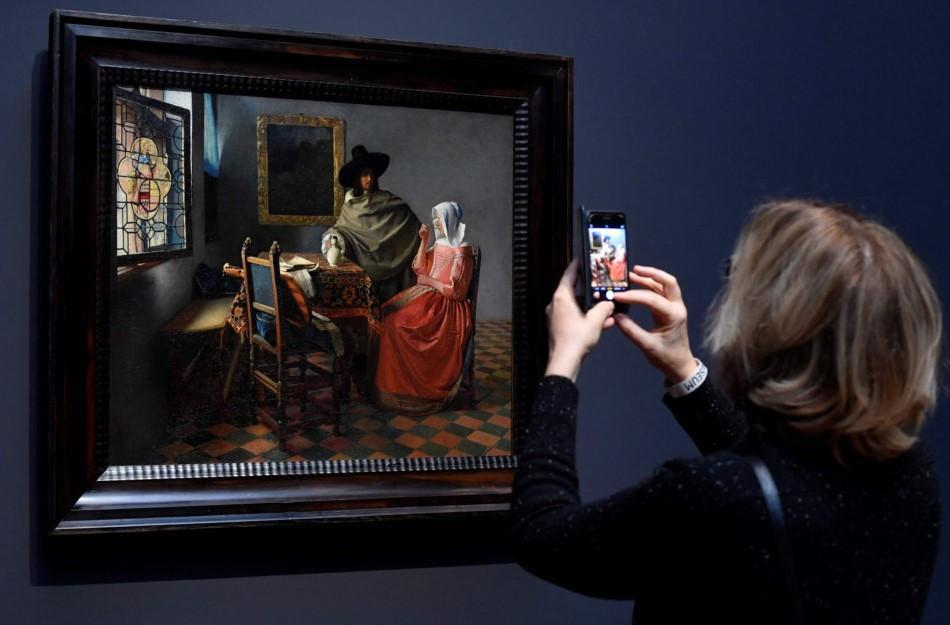Museum hosts blockbuster Vermeer exhibition
AMSTERDAM

The Dutch master Johannes Vermeer himself never got the chance to see so many of his paintings in the same place.
Amsterdam’s Rijksmuseum has brought together 28 of Vermeer’s luminous masterpieces from around the world, in the largest-ever exhibition of the 17th century artist’s works.
Curators hope the blockbuster show, featuring some three-quarters of his modest output of around 35 paintings, will also shed light on the enigmatic creator of “Girl with a Pearl Earring” and “The Milkmaid.”
“Never in history have 28 paintings by Vermeer been gathered,” Rijksmuseum General Director Taco Dibbits told AFP at a preview.
“He didn’t even see that many together himself.”
Famed for their use of light and colour and their tranquil yet haunting indoor scenes, Vermeer’s paintings practically shine from the walls of the dimmed galleries at the Rijksmuseum.
The works have been brought from museums and collections around the world, including Washington, New York, Tokyo, London, Paris, Dublin.
“It’s a very happy reunion,” said Dibbits.
Interest is so intense that the Rijksmuseum has already sold 200,000 tickets for the exhibition, which opens on Friday until June 4, the most ever for one of its shows.
Part of the appeal is the mystery surrounding the man often called the “Sphinx of Delft.”
Vermeer (1632-1675) was born into a family of Calvinist traders but converted to Catholicism after marrying a wealthy woman with whom he had 11 children.
But there are very few records of his life, and compared to Dutch “Golden Age” artists such as Rembrandt his work languished in obscurity, until a reappraisal in the 19th century.
Vermeer rose to megastar status with the publication of the novel “Girl with a Pearl Earring” by US author Tracy Chevalier, based on the painting that has been loaned for the exhibition by the Mauritshuis in The Hague.
The book also spawned a 2003 Hollywood movie starring Scarlett Johansson and Colin Firth.
“Wonderful, it’s wonderful,” Chevalier told AFP after viewing the exhibition.
“I’m so glad people are going to see these paintings together and build a picture for themselves of what Vermeer was,” said the author.
Most of Vermeer’s works focus on women, often caught in the midst of acts like writing a letter or playing a musical instrument, and Chevalier said he was “just presenting women in the best possible light, literally and figuratively”.
Her favourite in the exhibition - apart from “Girl with a Pearl Earring,” of course - was “The Lacemaker”, a tiny work of exquisite beauty loaned by The Louvre in Paris, she said.
‘Time stands still’
Highlights also include three works from the Frick Collection in New York, the newly restored “Girl Reading a Letter at the Window” from Dresden, and “Woman Holding a Balance” from the National Gallery in Washington DC.
For the curators, who say it is a “once in history” exhibition, Vermeer’s appeal is also about his creation of quiet worlds so realistic that the viewer feels they could lose themself inside.
“We live in a world today where it’s so hectic,” said Dibbits.
“He had more than 10 children, there was a war going on outside in Europe, yet still he creates these ideal spaces where time stands still.”
The exhibition has however felt the pressures of the real, modern world, with the authenticity of one of its works - “Girl with a Flute” - being called into question by the gallery that loaned it.
The National Gallery of Art in Washington said last year it was likely painted by a “studio associate of Vermeer” but the Rijksmuseum says it thinks it’s authentic.
“It’s very important to have these discussions,” said Dibbits.
The magic of the master is still bewitching for staff at the Rijksmuseum.
“For me personally Vermeer is one of the greatest artists in the world,” said Gregor Weber, the Rijksmuseum’s fine arts department head and author of a recent book showing Vermeer was influenced by a pinhole camera that was first introduced to him by Jesuit priests.
“To have three quarters of his oeuvre together here in Amsterdam under one roof is the crown of my work.”
















